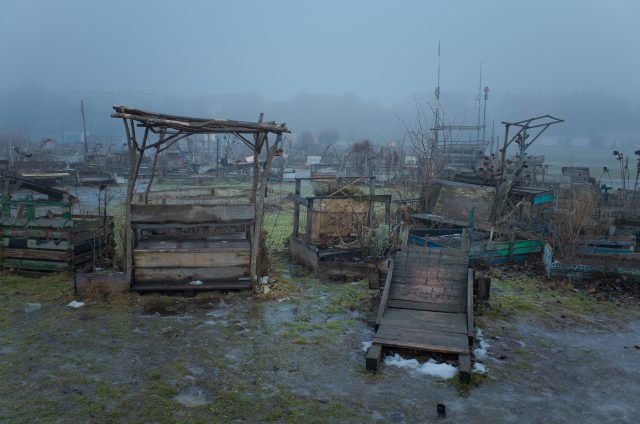It is hard to get away from the impression that we are epigones. This is not, or not merely, the case due to the carnage wrought by Mr. Trump and his various protégés on the none too august institutions of American liberal democracy.
Threats of a more super systemic nature, from artificial superintelligence, resource depletion, and accelerating climate change, the prospects for utopian outcomes have not just receded beyond the horizon, they have dropped off the edge of the world.
Conceptions of utopia have a provenance stretching back at least two millennia. From Plato’s Republic to More’s eponymous sixteenth century text, to Harrington’s Commonwealth of Oceana, the project of reconfiguring society to provide an ideal environment for human flourishing is common refrain in the intellectual history of Europe and North America.
Since the end of the eighteenth century, conceptions of utopia have come to be entwined with various political ideologies. In the beginning, this tended to be the territory of the radical left, from the French Jacobins, to the myriad varieties of socialism that arose in the course of the nineteenth century.
Ironically, Karl Marx, whose writings formed the basis of the most influential utopian project of the last hundred and fifty years, said little about the sort of society that he thought would arise in the wake of proletarian revolution. In The German Ideology, a text composed by Marx and Engels in early 1846, but never published, Marx wrote of a future communist society in which, “nobody has one exclusive sphere of activity but each can become accomplished in any branch he wishes, society regulates the general production and thus makes it possible for me to do one thing today and another tomorrow, to hunt in the morning, fish in the afternoon, rear cattle in the evening, criticise after dinner, just as I have a mind, without ever becoming hunter, fisherman, herdsman or critic.”
Yet, even in his most directly revolutionary writings, such as The Communist Manifesto, Marx abjured speculation on the actual shape of post-revolutionary society, in no small part because he didn’t want to speculate on what conditions would obtain then, preferring instead to write extensively about conditions that currently existed.

The history of the twentieth century is, to a great extent, the history of competition between political ideologies: communism, fascism, and liberalism. But only the first two of these are associated with properly utopian projects. The racial utopia envisioned by many varieties of fascism (particularly Hitlerism), horrific thought it might be, is still a utopia. Liberalism, by contrast, involves not a utopian project, in the sense of a society embodying a substantive ideal, but rather the opportunity for individuals to create conditions optimal for their thriving and enjoyment from the imperfect materials and conditions in actually existing (i.e. non-idealized) society.
Assertions of the end of ideology is the hallmark of certain phases of postwar history. The victory of liberal capitalism over its two competitors in 1945 give rise to period waves formed by attempts to revive utopian projects and attempts to pile more dirt on their collective grave.
In the 1950s, anti-communist writers wrote of the end of ideology and the birth (or return to) a more moderate approach to politics. This can be seen in prominent works such as Raymond Aron’s The Opium of the Intellectuals, Judith Shklar’s After Utopia, and Helmut Schelsky’s Die skeptische Generation. In a society still attempting to heal the wounds of the catastrophic conflict between fascism and Stalinism, it is not surprising that this outlook, as much aspirational as factual, would gain traction.
Still, it was just over ten years after the publication of Die Skeptische Generation, in which Schelsky had argued that German youth were no longer interested in the radical projects that had roiled the first half of the twentieth century, that the student movement and other elements of the ausserparlamentarische Opposition would take to the streets.
The radicalism of the 1960s showed that, at least on the left, there was still the potential for radical ideas to transform the imagination into political action. The slogans of the era reflect this clearly, from the frequently repeated APO call for all power to be vested in the imagination (“alle Macht der Fantasie”) to the Situationist International’s call to, “be realistic, demand the impossible” (“Soyez realists, demandez l’impossible”).
Once again, there was a pronounced disconnect between the utopian superstructure of these movements and the practical foundations. The actions they undertook tended to be directed at resolving particular issues rather than the reshaping of society in broader terms. And, in fact, this prefigured the transformation of the mass political organizations of the 1960s to the more narrowly focused organizations of the 1970s such as the feminist movement, environmentalism, and the anti-nuclear movement (which admittedly had roots that went back to the 1950s).

From the 1980s, the era of “greed is good” and Reagan’s distinctly non-utopian “Morning in America” to the so-called “great moderation” of the late 1990s and early oughties, the pendulum had once again swung away from the utopian end of its sweep. Works such as Russell Jacoby’s The End of Utopia (1982) and Francis Fukuyama’s The End of History and the Last Man (1992), although expressing rather different political tendencies, continued the project of burying the ideological conflicts of the early part of the century and asserting the final turn to a more moderate and matter-of-fact approach to politics.
Once again, such predictions have come to grief. Fukuyama’s view that the future of politics would be limited to sorting out the technical issues within a liberal democratic politics accepted as the most reasonable norm by all and sundry have been brutally refuted both by the rise of militant Islamism and by the growth of kleptocratic capitalism elitism.
In general, the idea that liberal capitalism constitutes the high road to optimal outcomes for most people has rather less traction since the 2008 financial collapse demolished the financial position of a large number of people whose assets were far removed from the casino capitalism undertaken by hedge funds masquerading as banks and mortgage lenders. One needn’t look far to find articles and the mainstream press in which the continued or renewed relevance of the work of Karl Marx is mooted.
But things are different now. In a past era, it might have seemed that a full-scale social transition of a society from capitalism to socialism, such as that undertaken in the wake of the Bolshevik seizure of power in Russia might be on the cards. Varieties of Leninism still exist and retain this as a project in their political arsenal.
At a more moderate level, there are some (Paul Mason for instance) who hold that a rational and systematic transition from a collapsing liberal capitalism to some post-capitalism mode of political and economic organization is possible. Yet neither in the more radical nor the more moderate versions of the movement to transition away from capitalism take sufficient account of factors both within and outside the system.
While it is commonly recognized that resource depletion will require a transition to a new mode of organization (particularly with regard to energy production), moves toward transition stand every chance of being thwarted by the power politics of the owners of capital. The recovery of the political fortunes of the radical right, muted most of the second half of the twentieth century by their association with Nazi genocide, makes the prospect of establishing a more just social order more remote than it has been at any time since 1789.

It is hard to imagine in the current conjuncture that the ideological damage wrought on the public sphere by the rise of “post-factual” politics will not, in the short of medium term lead to a condition of post-democracy (to borrow Colin Crouch’s term).
In and of itself this is nothing new. But of greater concern is the fact that the threats both from within the system and without are not just present but accelerating. The advent of ever more frequent superstorms, stemming from the accelerating rise in aggregate global temperature, make it hard to imagine a lifestyle ideal for human flourishing compatible with the mode of life available to most humans as a practical matter.
Moreover, the extension of technological capacities for surveillance, a genie which simply cannot be packed back into the bottle, suggests that it will be difficult to avoid a dynamic that ends up in more or less Orwellian consequences.
The development of autonomous weapons systems, security algorithms, and artificial superintelligence further suggest that limitation of human capacities to reorder society in ways prejudicial to the needs and imperatives of current owners of capital. Arguably, we have reached a tipping point beyond which no New Jerusalem can be built.
Perhaps there is a silver lining to all of this. The big picture utopianism of the twentieth century did much to motivate political imaginations. But it also often resulted in a kind Faustian readiness to reconfigure things irrespective of how many corpses this produced. The positive dimension of utopian thinking has, perhaps, been that it was a big picture that allowed people to think small.
There are, it is fair to say, challenges facing human beings (climate change, technology, overpopulation, resource depletion, etc.) that are unexampled in history. There is no way to effectively predict what outcomes will be generated from their manifold interaction. The utopias of the past have been overtaken, blown away by the beating wings of the angel of history. It remains to be seen what can be pulled from the wreckage.
Photographs courtesy of Joel Schalit.





